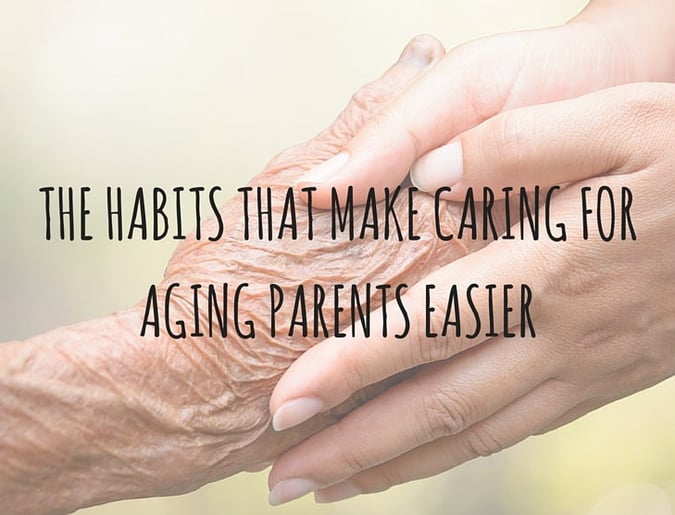
It happens to many of us: we watch a dear friend provide full-time care for aging parents, and we marvel at her patience and kindness. We silently offer thanks that it’s her and not us, because, well, she’s patient and kind! And then one day we realize that our parents need help.
If you suddenly find yourself among the group of people Mayo Clinic calls “informal caregivers” who provide 80 percent of the long-term care in the United States, be patient with yourself. Take heart in knowing that even the most selfless and compassionate caregivers struggle with balancing personal needs with familial obligations. Caregiver stress and burnout can take a tremendous toll on your own physical, emotional, and mental health. If, like most caregivers, you’re trying to maintain a career, or you have your own active family to manage at the same time, the overwhelm can feel unbearable.
You need a short list of proven and creative strategies that people in your shoes utilize to deal with caregiver stress. Here are six of our favorite solutions.
1. Make a “personal time” action plan.
List your favorite activities that bring you deep relaxation and fulfillment. Yoga, gardening, playing piano, running, bowling — put them all down in black and white under “Me Time.” Decide how many hours every week of these activities you need to feel balanced and cared for.
2. Put it on the calendar in ink.
Mark your “Me Time” on the calendar just as you do medical appointments for your loved one and take it just as seriously. No erasing or scheduling over your personal time unless it’s a true, can’t-be-avoided emergency.
3. Recruit volunteers.
Friends, family, neighbors, co-workers, and church congregations are all potential support team members for you. Make a list of specific tasks that you need help with, and when people ask: “Do you need anything?” pull out your list and thank them profusely.
Explore community respite care options, including adult care centers with day programs or in-home health aides. You might be eligible for transportation help and meal delivery. Medicare provides your loved one with up to 5 days of respite care in a skilled nursing facility or hospital specifically so that you, their caregiver, can take a restful break.
4. Stay socially connected.
Join a support group for caregivers where you receive validation and gather problem-solving strategies from others in your shoes. While you’re creating new friendships, make sure to continue nourishing existing friendships by putting “play dates” on your calendar and honoring them.
5. Set firm boundaries.
“No, I can’t” is the hardest three-word sentence for many people, especially the naturally selfless. But when you’re caring for aging parents, it’s imperative that you find a comfortable and clear way to let others know that certain things are no longer possible for you. Over-commitment adds more stress that comes straight out of your personal energy reserves.
6. Look into the Family and Medical Leave Act.
If you work at a company with 50 or more employees, you are entitled to up to 12 weeks of unpaid, job-protected leave in order to care for a seriously ill family member. Under the Family and Medical Leave Act, your employer is obligated to continue your benefits during your leave period. Ask your boss if there is a willingness to work with you on a flexible or reduced work schedule so that you don’t lose your entire paycheck. Your employer might even surprise you with an even more generous arrangement than the FMLA prescribes, which is permissible under the act.
Many studies show that caregivers are at an increased risk for anxiety and depression. If you are having trouble coping with your emotions, or feel unwell and drained much of the time, be honest with your doctor. Resources are available, and you’re not alone. Millions of Americans are caregivers, and with the 65+ age group expected to double by 2030, the number of family caregivers will continue to rise. Charity begins at home, so while you’re caring for aging parents, be especially charitable to your own self.












